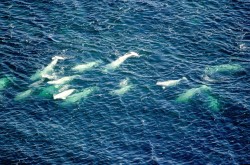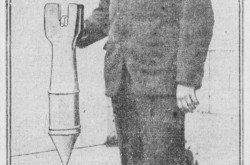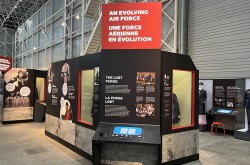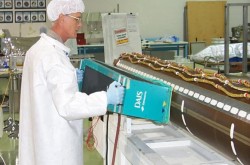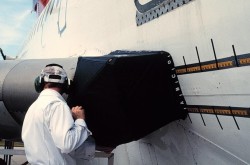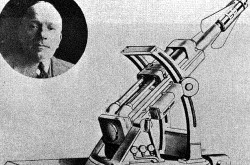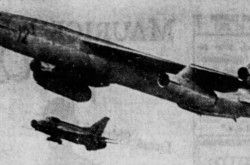Legacy Series Episode 3 - Bomber Command
In Episode 3, RCAF veterans and others describe what it was like to fly bombing missions during the Second World War — and what it was like to suffer the consequences on the ground. From the brotherhood of crews to the challenges involved in accurate targeting, their firsthand accounts bring history to life in an engaging and often moving way. Topics include briefings, the importance of heated flightsuits, the perils of searchlights and flak, victims of bombing raids, and the moral dilemmas many bombing crews faced.
The interviews are interspersed with archival photographs and film footage. Scenes between Cadet Andy and Captain Johnny C provide context and additional information on what it was like to go to war.
Transcript
0:12
I didn’t mind dying.
0:14
I wasn’t afraid of dying, and I expected to die,
0:16
but the thing that really bothered me was my parents.
0:22
I knew it was going to be a particular blow to them.
0:26
It would have been something terrible.
0:28
And that’s what I worried about all the time, about dying.
0:32
But as far as dying in itself, it didn’t bother me; I expected to.
0:40
But I was lucky.
0:41
I’d like to emphasize again it was all luck.
0:44
Survival was 100% luck.
2:10
Pilots, navigators, bomb aimers, wireless air gunners, and gunners, were all in little groups.
2:19
2:20
Well, our pilot went over and he picked out a navigator and he told the navigator
2:32
He says, “Now you go pick the rest of the crew.”
2:35
Some people went for religion.
2:38
If you were religious, you got talking to other people that were religious, too, and
2:42
you crewed up.
2:44
Other people were drinkers, which included me and all my crew
2:50
but we didn’t drink to excess, of course.
2:52
But you walked around with a big stein of beer in your hand, and they knew you were a drinker.
2:56
2:57
I look back and see how we relied on them.
3:01
Each person . . . you had to rely on the other person.
3:06
And a crew was a crew, and if one was lax, you’d never survive.
3:11
They’d become like a family and, believe me,
3:16
each one of us would consider the other one much closer than I would consider my brother.
3:27
So you really flew a Lancaster?
3:29
I still do…with the crew.
3:31
Speaking of crews.
3:33
I guess it really was important you got all the right personalities together.
3:37
What if you were the odd man out?
3:39
What are you gettin’ at?
3:40
Like if you had to hook up with a crew that didn’t drink and you did.
3:44
Or weren’t religious and you were.
3:47
Wouldn’t you feel like an outsider?
3:49
Up there, every crew is only as strong as its weakest link.
3:55
Everyone has to have each other’s back or things go bad quick!
4:00
And what if a crew member doesn’t pull his own weight?
4:04
You take him aside and tell him what’s what.
4:06
And if he doesn’t start pulling his weight, you set him straight until he does.
4:13
You would even go as far as singling him out?
4:15
Yeah.
4:16
Whatever it takes.
4:17
No.
4:18
No. That’s, that’s so wrong.
4:20
Wrong!
4:23
Let me tell you what’s wrong Andy.
4:26
It’s worrying about someone’s feelings when it’s my life and the crew’s on the line.
4:36
4:50
We used to get bacon and eggs before we took over.
4:55
4:55
Actually, in those days it was a big deal, because in England everything was rationed.
5:03
So, I always considered that being my last meal, you know before (laughs) execution.
5:13
We went from the breakfast down to the briefing room.
5:18
Once everyones in, they closed the doors, locked the doors.
5:20
5:22
There was a big screen, which was covered.
5:26
The Commanding Officer of the squadron walks in—
5:30
—and he would pull a curtain, and there was your route marked on a tape.
5:36
And if it was a tough route, you’d hear all kinds of sighs and cries out from these guys.
5:42
5:43
And if it was an easy route—on the coast where you didn’t have far to go—everybody’d be quite happy.
5:48
5:51
What if you thought the mission wasn’t safe.
5:54
Could you refuse to go?
5:56
Refuse an order!
5:58
This is war Andy!
6:00
It’s not like…not doing your homework when you’re told to.
6:04
Or on the job, where if you don’t do what the boss tells you, you get fired.
6:09
Here, not following orders can get you court martialed.
6:13
Even imprisoned.
6:15
You fly the damn sorties.
6:37
Inside, it’s quite cold, because you’re at 20,000 feet, and the temperature is really frigid up there.
6:44
6:44
So we used to have a big pipe, like you’d have in a dryer.
6:49
A flexible pipe would come down, and it was attached to one of the engines.
6:53
It’d blow heat down into the nose where we were; because you’re working with your
6:59
bare hands, and it’s pretty hard to work if they’re really cold and you’re trying
7:05
to work a handheld computer.
7:07
Way back at the back was the tail gunner, and he had an electrically heated suit because
7:15
it was pretty cold sitting out there.
7:17
I was a tail gunner, and it was so cold.
7:22
The temperature was -40 to -60 degrees.
7:26
And I wore all this clothing.
7:29
I wore stockings up to my thighs, a turtleneck sweater, my battle dress suit, then an electrically
7:38
heated suit—and it had slippers and gloves.
7:43
Then I put on a big suit—it was quilted—over the top of that.
7:50
Then I put my flying suit on, then I’d put my parachute on.
7:57
Did you ever lose your focus, being that cold for such long stretches of time?
8:04
I’d be lying if I said no.
8:07
But what you have to understand, things can get pretty routine… sortie after sortie.
8:13
But then your world can be turned upside down in a moment’s notice.
8:17
Then you don’t feel a thing.
8:18
You just react to the threats.
8:38
I hated searchlights.
8:41
I was scared of searchlights.
8:43
Everybody had certain things that they were afraid of.
8:46
Fighters was another thing; flak was another thing.
8:50
But we got coned one time.
8:53
Usually if you got coned with searchlights, you didn’t get out of the cone.
8:57
They used to hose pipe the flak right up the cone, and that was the end of you.
9:04
If they never hose piped it up, it meant there was fighters there; and it was just a matter
9:12
of a minute or so before a fighter got you; you were completely blinded.
9:17
It’s hard to imagine just how bright it was.
9:22
We tried everything to get out of the cone.
9:24
We dove, we climbed, we slipped here and there.
9:28
So finally, the skipper stopped and he slipped sideways and he slipped right over another
9:35
aircraft that was underneath.
9:36
And we didn’t see the other aircraft, but all of a sudden we were bright, and then there
9:44
was complete darkness, and guess where the searchlights were?
9:48
They were on the aircraft underneath us.
9:52
It was shot down within seconds.
9:56
I was never so happy: getting out of the cone and seven guys all going down to their death right away.
10:07
10:08
I couldn’t believe how I felt so good that these seven guys were dying instead of us.
10:19
How do you wrap your head around that?
10:21
I don’t understand.
10:23
Why would you wrap your head around anything?
10:24
No.
10:25
You don’t get it.
10:26
I mean seeing your buddies…guys you fly with get killed because you moved your plane
10:31
out of the searchlight and put them in the “cone’s” bull’s eye.
10:35
That's part of the fog of war Andy.
10:39
We’re all just trying to survive up there and complete our sorties.
10:44
And in order to do that, we often, like I said, have to react instantly to the threat.
10:52
And then, it’s the luck of the draw.
10:55
Any skipper could do that to me.
10:57
And I wouldn’t think any less of him…if I survived that is.
11:18
Flak is another name for— it’s a slang expression: you might say, for anti-aircraft fire.
11:27
The Germans had a lot of anti-aircraft guns around cities that were likely to be bombed.
11:35
When it came up, you’d see a big black burst, you know, like a black cloud.
11:44
You’d be full of holes.
11:46
You see, these 88s would burst.
11:49
They were shooting at you, but they didn’t have to hit you, as long as they burst close to you.
11:55
It was a shell, and the shrapnel would go through your aircraft.
12:01
If it never hit a vital spot, you were fine.
12:03
If it never hit you, you were fine.
12:05
My skipper, he used to call everybody up.
12:08
Every individual, he'd call them up, every fifteen or twenty minutes, to see if they were still alive.
12:16
If he never got an answer, he’d send somebody back—usually the wireless operator
12:22
send him back to check on you, and he’d come back and say that you were dead or you were wounded or something,
12:30
with flak that had come through the aircraft.
12:34
And a funny thing happened to me one time.
12:37
There was a big hole, came through my turret.
12:41
It was about the size of my fist; and it went in the bridge of my nose—took all the skin off, but it never bled or anything.
12:52
And I wanted this piece for a souvenir.
13:14
Our trip was a night trip.
13:17
And that is actually scary, because it’s awful dark out there.
13:24
And you’re going through clouds.
13:26
You don’t know how close the other aircraft is to you.
13:30
There are collisions between aircraft.
13:35
On one of the last trips, there was three mid-air collisions, so that meant six crews.
13:43
So and the planes that collide, they would just be going down, and there’d be a wing and part of a fuselage.
13:51
And when a plane starts to spin like that, you can’t get out, because of the force of the spin, you know.
13:58
So they lost a lot of.. . I think most of the guys died that were in the airplanes.
14:05
And out of all the losses that day, there were seven aircraft lost, and six that were by collision.
14:11
And, there was two aircraft directly in front of us, and they collided.
14:16
I don’t know what happened; they must have hit a slipstream or something.
14:22
And there was seven or eight chutes came out.
14:27
One guy waved to me, went right by me in his chute, and waved to me and I waved back.
14:34
They went down in the water just before in the North Sea, just before we reached the island.
14:41
And I was working with a fella one time quite a few years later, and I was telling him about this.
14:44
14:45
I said I often wondered what happened to those guys.
14:48
And he said, well I can tell you, I was on the their squadron; they were both from the same squadron.
14:54
He said they were picked up within twenty minutes and they were all dead from exposure to the cold water.
15:05
How could you hit each other in something as big as the sky?
15:08
You think it wouldn’t be possible.
15:10
But it is.
15:12
You see we fly in a tight formation so the enemy fighters can't pick us off.
15:17
Strength in numbers.
15:19
Hundreds of Lancs heading towards the same point, the same sortie.
15:26
Wave after wave.
15:27
Lots of traffic.
15:29
Lots of chop.
15:33
Accidents are bound to happen.
15:34
They happen in every sortie.
15:36
Can’t get away from it.
15:39
You make it sound like it's a little fender bender where nobody gets hurt.
15:43
But you’re talking about wiping out entire crews! Planes! Everything!
15:48
Biting the dust is a risk we all take every time out.
15:54
But the enemy has to be hit.
15:57
Hit hard.
15:58
Over and over.
16:01
Aircraft and crews can be replaced.
16:04
We do what you have to do to win this war.
16:06
And then maybe...maybe no one else has to die.
16:31
The engineer goes out of his seat and stands behind the pilot, looking out of the astrodome
16:43
—which is a dome above the aircraft where the navigator takes astro-shots.
16:54
Now, the reason he goes there is to watch out for aircraft above, who may have their bomb bay doors open.
17:05
17:05
If an aircraft above you has its bomb doors open, you’d better get out of the way in a hurry,
17:12
because you’d get a load of bombs on you.
17:17
They were over the target, and the bomb aimers were on the bombing run.
17:23
And the bomb aimer is saying: “Uh oh, there’s another aircraft right under us.”
17:28
So he told the pilot go left, go to the port side.
17:33
So we went to the port side.
17:34
The guys below are looking up, and they go to the port side.
17:37
So we switch over to the other side; they switch over to the other side.
17:40
They were a lot more nervous than we were.
17:43
And this was going back and forth.
17:46
Finally, we went the opposite ways, and we went on and dropped our bombs.
17:49
Anyways, when we got back to interrogation afterwards and our bomb aimer got to talking to his brother, who was a pilot of another aircraft on the squadron.
18:02
Guess who was the pilot of the aircraft that was underneath us?
18:06
His brother!
18:09
A good thing he didn’t drop his bombs right then.
18:13
Sometimes you’d see a picture of when the bombs were dropped, there’d be an aircraft right in the centre of it.
18:23
So let me see if I got this right.
18:25
Not only did you have to worry about the enemy shooting you down from the ground and from the air.
18:30
You also had to dodge your own planes from colliding with you.
18:33
And to top it off, you had to worry about bombs being dropped from above by your own planes?
18:39
You’re a smart egg there Andy.
18:40
It’s called friendly fire.
18:42
It’s never on purpose and you pray to God it doesn’t happen to you.
18:45
But it happens in every war.
18:49
And how would you feel if you dropped one of your own bombs on your own aircraft?
18:53
I would…I felt bad.
18:59
But...you go on.
19:01
It’s part of war and you have to keep fighting. There's no choice.
19:04
19:05
There’s always a choice.
19:07
Oh yeah Cadet.
19:08
What war have you fought in?
19:28
The Germans used to put factories where they
19:31
were building aircraft and trucks and armament, right in the centre of cities.
19:38
And if you weren’t right on the target, you dropped it on a big hotel or something right close to it.
19:44
As you are approaching the target, the bomb aimer pretty well takes over control of the aircraft.
19:56
He’s lying down on his stomach, looking out visually at the target.
20:04
And he tells the pilot to go a little bit left, a little bit right, little bit left, little bit right.
20:11
And finally he says, “Steady.”
20:14
And when he says “Steady,” the next thing is, he presses the button; the bombs are gone.
20:22
Each airplane has a map, and a bomb aimer with his watch.
20:31
And he’s supposed to deal with the navigator to get over the target exactly at the time.
20:38
. .pfft!
20:40
So, over the target, you’re looking down, looking down.
20:46
. . You look up: there’s another airplane just above you with its bomb doors open.
20:53
So the bomb aimer tells you, “Hold it! Hold it! Hold it!”
20:58
I said, “The hell!
20:59
We’ll move over.”
21:00
He lets go the bombs.
21:02
We missed the target by miles, I guess, but we missed those bombs coming down, too!
21:08
So the idea that you’re bang on target—not possible.
21:13
But every time, you had a camera in your airplane, it’d take a picture of your bombs landing
21:22
(laughs).
21:24
My bombs that day?
21:26
The target was over there to the left; the bombs were over there to the right.
21:33
So you can’t believe the pictures you see, ‘cause I’m not the only one.
21:40
That’s insane!
21:42
Just randomly dropping your bombs off target!
21:44
We do the best we can with what we've got.
21:50
Our technology is getting better all the time.
21:53
We have pathfinders, radar, and navigation systems.
21:58
We’re getting more accurate at hitting targets.
22:03
But sometimes still it’s like dropping a coin in a wishing well.
22:09
You know how the ripples spread out when the coin hits the water.
22:11
That’s like our bombs.
22:13
Eventually we hit the target.
22:16
And when we miss, civilians die.
22:21
They die in every war.
22:23
The greater the war, the more civilians die.
22:27
It’s plain and simple.
22:29
What?!
22:31
It shouldn't be plain and simple when it comes to civilians dying.
22:53
Imagine 100 Lancaster bombers all in one level,
22:59
flying, and all of ‘em releasing their bombs at the same time.
23:04
It was just nothing left down below.
23:08
At first, it wasn’t so bad; but then it was every night and every night—always came during the night.
23:17
So that was the beginning, and then it became worse and worse and worse.
23:22
We were sitting there in the basement.
23:27
And we listened, and we heard the bombs and the planes coming closer.
23:34
My mother was sitting beside me, and she was kind of shaky, and I was taking her arm.
23:46
It was— it was not nice.
23:50
You know what?
23:51
When I meet a girl from London, I feel she lived through the same thing as I did:
24:01
she understands me, and I understand her.
24:04
I was in London when they bombed the docks.
24:09
And, at that time, they came over in the afternoon and they set the Surrey docks on fire.
24:19
And they came back at night, and they finished it off.
24:26
You could see the flames from everywhere.
24:29
And, in those days, most people—ordinary people—didn’t have telephones.
24:36
So you couldn’t get in touch with your office.
24:40
So, when you got to your office, the only way you knew that people had had a bad night,
24:48
was they just weren’t there, and the empty desk was there.
24:53
I think that was the most horrific part of it, because you didn’t know what had happened to the people.
25:02
25:03
You know, sometimes they turned up, but sometimes they didn’t.
25:09
Their mission was clear: just flatten the cities.
25:14
Yes, there were military targets, yes etcetera, etcetera,
25:17
but they meant to demolish—destroy—German cities and the population.
25:24
You see, a lot of people blamed or accused Bomber Command of bombing civilians.
25:32
And of course we did, we bombed, bomb everything.
25:41
But in war, you bomb what you have to, and you do what you’re told.
25:50
How do you live with the knowledge that you probably killed civilians?
25:56
Remember, it's the Jerrys who started it.
26:00
But does that make it right?
26:02
Listen Andy, I didn’t start this war.
26:08
Men above my pay grade, who are much smarter than me, did.
26:13
I just do as I’m told to do.
26:16
The responsibility falls on their shoulders.
26:19
They’re the ones who gave one time civilians, like me, weapons that kill.
26:28
Go talk to them.
26:49
When you got back, you were always checking to see if everybody was back.
26:54
And then they’d say, well, you know, so and so isn’t back.
26:57
And, after a while, you knew.
26:59
If he wasn’t back in an hour or two, he didn’t have enough fuel—or maybe you found
27:04
out they’d landed in France or, which was fair enough, or in some other airport.
27:11
But, other times, they were just missing, and it would take a day or two to find out
27:15
they were either dead or prisoners of war.
27:18
But it was always an anxious time waiting to see that every crew came in—after you got back.
27:27
We had fourteen aircraft.
27:29
“Maximum effort” was what we had to send every night.
27:33
And our maximum effort was fourteen aircraft.
27:36
Out of that fourteen, there was always one that never came back.
27:45
We had to do thirty trips, so your chances of getting through thirty weren’t very good!
27:51
After you’d done about fourteen, you’d survived about 100%.
27:58
Your chances after that: you were way above the average.
28:03
We were very, very lucky, I think, to survive.
28:09
I think it was about 95% luck and 5% skill.
28:21
Bomber Command’s losses were terrible, you know, ...terrible.
28:24
Those who were being lost were, you know, really young guys—well educated,
28:29
and a great drain on the country that they should be lost like that.
28:34
But they were.
28:36
And looking at that, the bombing, it can’t be looked at as being in vain.
28:43
We had about 10,000 young Canadians— average age of about twenty-two
28:49
—that were killed in Bomber Command.
28:54
So it was pretty rough.
28:56
I think we suffered the highest losses of anybody in the war.
29:19
At the end of the war, the head of Fighter Command in England was decorated by the Queen;
29:27
but the head of Bomber Command wasn’t.
29:29
That was, I think, because of the bombing that he was doing: Air Vice-Marshall Harris.
29:36
His idea was that he could shorten the war, or maybe finish the war, through bombing.
29:42
Because to do it on the ground would take maybe much longer, and cost many more lives.
29:48
Of course, a lot of people used the view that the Germans bombed England,
29:54
and we were justified in bombing them back.
29:58
I don’t know whether that’s right or not, but they did a lot of havoc in England, in their bombing.
30:05
They bombed a lot of civilians, killed a lot of civilians.



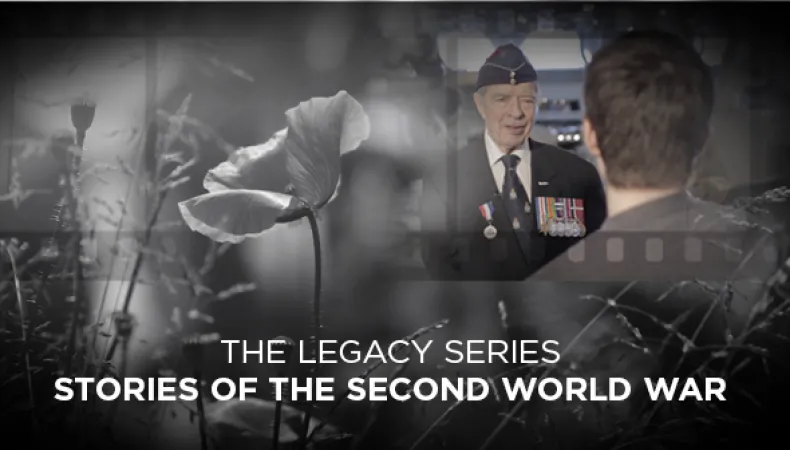

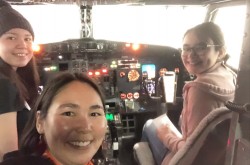
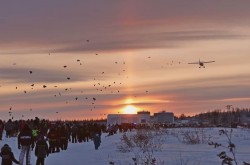
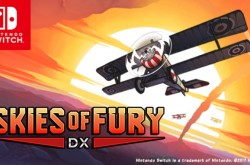
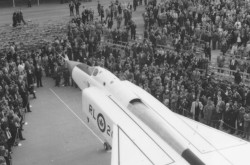
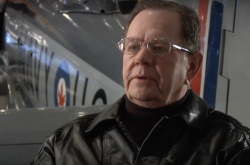




![A block of photographs showing some of the people involved in the bombing of beluga whales in the estuary and gulf of the St. Lawrence River. Anon., “La chasse aux marsouins [sic]. » Le Devoir, 15 August 1929, 6.](/sites/default/files/styles/thumbnail_7/public/2024-09/Le%20Devoir%2015%20aout%201929%20page%206.jpg?h=584f1d27&itok=TppdLItg)
